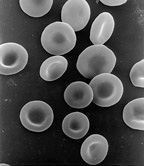red blood cell

Red blood cells, or erythrocytes, are the most common type of blood cell and the vertebrate organism's principal means of delivering oxygen to the body tissues via the blood flow through the circulatory system. They take up oxygen in the lungs or gills and release it while squeezing through the body's capillaries.
These cells' cytoplasm is rich in haemoglobin, an iron-containing biomolecule that can bind oxygen and is responsible for the blood's red color.
In humans, mature red blood cells are oval and flexible biconcave disks. They lack a cell nucleus and most organelles to accommodate maximum space for haemoglobin. 2.4 million new erythrocytes are produced per second. The cells develop in the bone marrow and circulate for about 100–120 days in the body before their components are recycled by macrophages. Each circulation takes about 20 seconds. Approximately a quarter of the cells in the human body are red blood cells.























